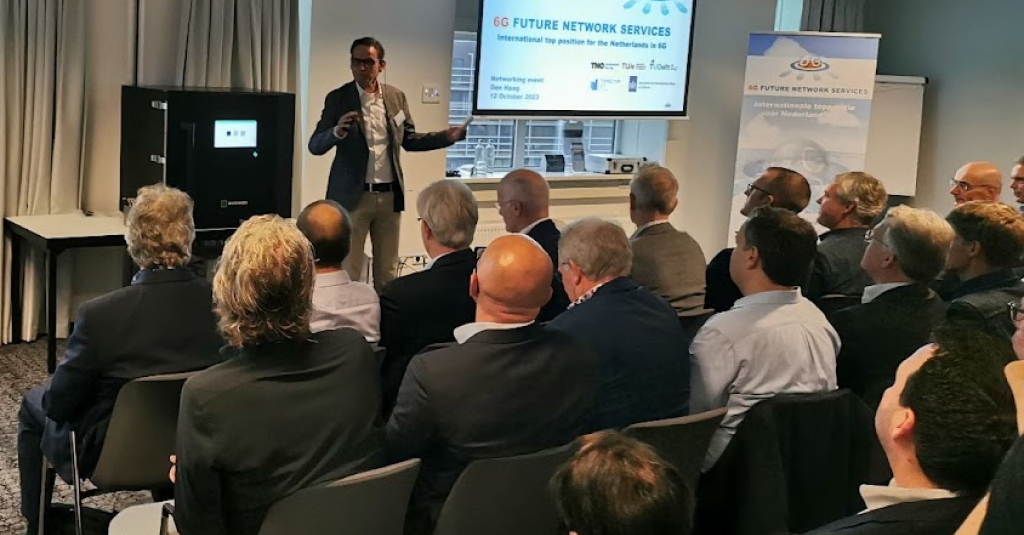IS-Wireless joins the Dutch consortium to set the foundations for 6G in Europe

A consortium of private companies and academic facilities join forces to research the sixth generation of mobile networks. The Future Network Services (FNS) project will be backed by at least 61 million EUR granted by the Dutch National Growth Fund. The consortium aims to take position in determining the development of 6G globally, work on setting the foundation for 6G standards in order to meet the social requirements in terms of reliability, digital sovereignty and sustainability as well as to develop a strong Dutch 6G ecosystem.
The Future Network Services programme brings together a consortium of 60 partners – leading telecom and semiconductor manufacturers, mobile operators, ICT companies, technical universities and governmental agencies from the Netherlands as well as IS-Wireless – an Open RAN 5G solutions provider, already involved in a number of 6G R&D projects funded by the European Commision. The Consortium aims to set the foundation for 6G development by defining the technology qualities and laying the groundwork necessary to build the sixth generation of mobile networks in a highly flexible manner. It will be backed by 61 million EUR with prospects for another 142 million EUR worth of funding in the coming 6 years. The official kick-off of the project took place at the Delft University of Technology in the Netherlands on October 12th.
The project will aim to look into both the technologies contributing to the 6G standards and potential applications of the next generation of mobile networks. Assuring flexibility of the future networks using intelligent hardware and software will be necessary to make networks and applications more reliable and more durable – argue experts at IS-Wireless, an Open RAN 5G provider involved in the project.
Opportunity to contribute and gain advantage
6G networks are predicted to be fully defined, backed by proper standards and ready for commercial rollouts by circa 2029-2030. The government-backed project will not only make it possible in given time-span, but will also give the members of the Consortium a competitive edge.
We are committed and proud to be at the forefront of 6G research in Europe, as building innovative 5G networks is not the end game for us. Becoming a part of the FNS Consortium and being involved in the development of the new standard at the early stages, provides an opportunity to influence the shape of the upcoming generations of mobile networks, but also to offer new products to our customers as soon as the new technology reaches the right level, granting us a competitive edge – comments Adam Flizikowski, Head of R&D at IS-Wireless.
Joint efforts for rapid 6G development
Parties involved in the project will cooperate by sharing their know-how in respected fields of expertise.
We will be providing extensive knowledge of security measures as well as Radio Resource Management and deep understanding and experience in working with Disaggregated RAN to the Consortium. The FNS will provide an amazing opportunity to exchange the latest 6G findings with leading Dutch mobile networking, as well as HW and SW experts – says Adam Flizikowski.
While commercial deployments of 5G Open RAN networks by IS-Wireless are underway, the company’s R&D team participates in European research programmes on 6G technology.
The very first private Open RAN 5G network for Industry 4.0 in Poland using our solutions has been officially launched in Poland this year. Our products are also deployed in the UK and Asia – says Sławomir Pietrzyk, CEO of IS-Wireless.
At the same time IS-Wireless works on the very foundations of 6G. Participating in two of the three active EU projects under the ‘SNS JU – Stream C’ programme funded by the European Commission: 6G-Bricks and 6G-Sandbox, we contribute to creating an environment and tools for testing and developing 6G, aiming to define the future technology and its performance – experts at IS-Wireless explain.
Both programmes rely on our previous achievements in the field of 5G, which lead to our solutions’ commercial success. We pursue 6G research because we know it is essential to be at the forefront of mobile networks development. When the new technology reaches the right level, we are going to offer new products to our customers. We are excited to be able to bring our experience and expertise to the table in scope of the Future Network Services Consortium and further boost the international progress on 6G research – adds Sławomir Pietrzyk.